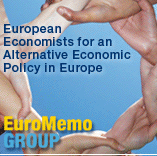From 24 to 26 September, the University of Roskilde hosted the 21st Euromemo Conference on Alternative Economic Policy in Europe.
It offered great working conditions. However, it did not manage to encourage its teaching staff and students to attend the workshop, despite great effort.
It had actually been clear beforehand that at least four questions would lead to lively discussions: The extorted “agreement” between Greece and the Eurogroup, and the memorandum it was followed by; the numerous “plan B” projects; the “report of the five presidents”; the negotiations on TTIP and further free trade debates.
This, however, neither motivated a susbtantial number of newcomers, nor those who would have had to travel quite a long distance. This is a pity because the participants rated the workshop as a great experience as it focused more clearly than ever on the questions of democracy and democratisation.
Right at the beginning, Nicos Theocarakis from the National and Kapodistrian University of Athens already handed the participants this topic on a plate. He acknowledged that indeed mistakes had been made in the Greek conduct of negotiations, but that the essential outcome had been expectable in light of the existing power relations. According to him, the dictate was not functional and the reason for that was to be found in the introduction of the 3rd memorandum: “Greece needs to build upon the agreed recovery strategy and develop a genuine growth strategy which is Greek-owned and Greek-led.“ The conditions for that, however, were simply non-existent, Theocarakis stated. When taking a look at the plans the presidents of the most important EU institutions have, according to the workshop’s participants it becomes clear that the way Greece is treated should entail the “completion” of the Eurozone. This is not surprising as it is all about the “globalisation gains” of the actors with the greatest economic power in free trade, investments and the augmentation of property.
While it is more than understandable to look for alternatives to the Eurosystem, it must be considered that a currency system is not just a technical matter. Exiting the currency union would not mean leaving behind all the constrictions that “globalisation”, the current circumstances and treaties within the EU bring about. Therefore, when working on the third memorandum, democracy will be at the focus. The necessity to put more emphasis on dealing with the configuration of capital and power structures and relations has become clear to all participants.
